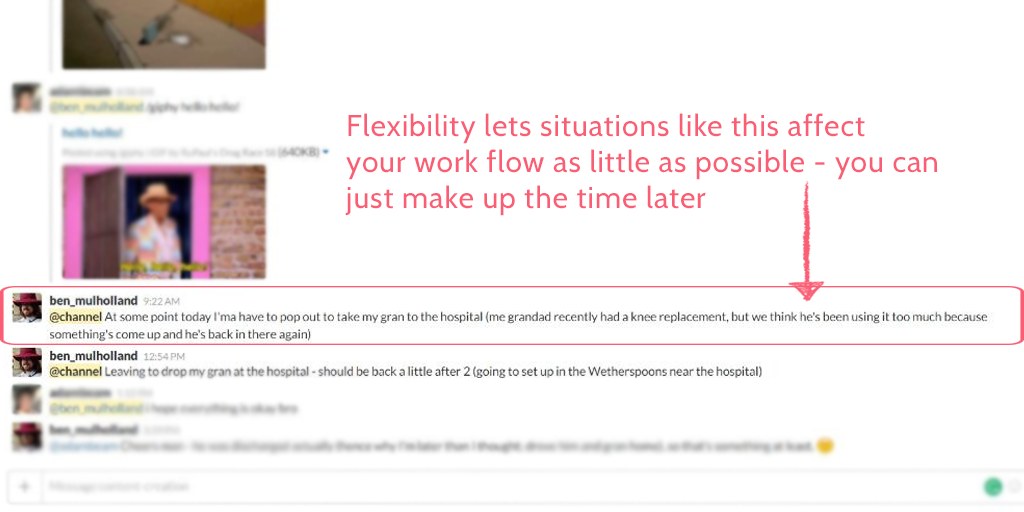Every remote worker I’ve seen stumble and fail over the last year has had one thing in common. They weren’t involved in the team culture.
I don’t just mean water cooler talk – culture includes almost everything aside from your actual output. The system you work by, the amount of meetings you have, the very structure of your teams is governed by your culture.
So when an employee doesn’t engage in culture it causes three things:
- A feeling of isolation
- A communication barrier
- A lack of motivation
- Lower productivity
However, when culture is done right, it powers motivation, encourages communication, and forms a solid, centralized base for your entire workforce to draw from.
Over the last year of remote work the practices I’ve seen benefit our team the most have been:
- Assigning mentors
- Hosting competitions
- Posing problems instead of solutions
- Centralizing information
- Documenting processes
- Giving structured freedom
Let’s dive right in!
Mentors are a must
I joined Process Street from a unique position, in that I’ve known my fellow writer Benjamin Brandall for nearly 10 years. We’re good friends and have always talked easily, so him being my mentor during onboarding should’ve been perfect for both myself and my employer.
It wasn’t.
Sure, I was more comfortable asking questions of him than a stranger, but it didn’t solve all my problems through the power of friendship.
I was able to hit the ground running because I was supplied with the right resources, and Ben actively reached out every morning to make sure that nothing was getting in my way.
The point is that even with a long-time friend as a mentor I didn’t speak up about all my problems, and neither will your new hires. Be it fear of looking stupid or guessing solutions instead of double checking, everyone hates being wrong, and you need to give them an easy out.
The mentor you assign to the employee needs to play an active role, rather than serve as a FAQ – it’s much easier to talk about an issue and solve it if you’re not the one to bring it up.
Not only that, but mentors familiarize hires with every aspect of your team culture. They make it easy to start introductions with the rest of your team, remind newbies of any processes which need completing, and can share their greater knowledge to help bring them up to speed.
“Hey Ben, know of any good sites for reading up on copywriting?”
Yes. Yes he did.
Challenge remote teams to engage them
Posing a challenge to your remote team is a great way to keep them interested in their work, and I’m not just talking about the tasks they are given.
Competitions get people talking outside of their regular clique (a very common thing in completely remote teams). You don’t want communication only going between 3 people – if one leaves, then the others will have less reason to stay too.
I was one of the worst examples of this. When I started at Process Street, I barely talked to anyone other than Ben.
This meant that when I was struggling I pulled longer hours instead of reaching out. I felt trapped in an isolated bubble because I didn’t know anyone else in the team or company.
Enter our Hearthstone tournament – a game I enjoy, so I was happy to pitch in. By setting our own rules everyone was put on the same level, and the tournament itself got me chatting to my opponents from support, sales, and our VAs.
In just a couple of matches, Process Street went from tech company to a group of people working towards the same goal. Friendly competition made work personal.
Another great way to provide a challenge is to do just that – provide a challenge.
Don’t instantly give the solution to a problem to your employees. Instead, bring a problem that needs solving, give enough information to get started, and help if they need it. Not only will they be more engaged with the task, but you might find that their solution is better than the one you could suggest.
After all, it’s hard to find a more efficient solution to a problem you already know the answer to.
Everything needs to be centralized
You need to have everyone’s work available at all times – otherwise the success of your schedule (if not company) rides on the availability of your team. This is something I only recently came across in a call with the I Done This team, but it is absolutely vital.
It’s called the bus factor – the number of people in your team who can be taken out of action (hit by a bus, won the lottery, etc) before your project falls apart. Could you access the work they’d done, or did your employee take it with them to Ibiza?
This isn’t limited to work either – you need to document your business processes so that anyone can access them when they need to. Remote teams are full of clashing time zones and availability, but a centralized core (e.g: storing all files in a company-wide folder and confining task conversations to Trello cards) deals with almost all problems the time differences present.
For example, we use our own checklist app to document our processes. This means that no matter what we’re doing, our entire team can find instructions on how to do their task accurately, and record their progress as they go. The same goes for reviewing each other’s work – we can see the process they went through, and how many tasks have been ticked off.
In the same vein, we each have shared and personal Trello boards, all of which can be accessed by our entire team. We record our tasks in Trello, using the cards to link to items such as the processes run, related documents, and record the time we spent on the task.
Last but not least, nothing is saved offline only. As part of the onboarding process we had to set up a local Google Drive folder, in which we save everything work related.
So, when my laptop of three years (two-time coffee soak veteran) started giving me electric shocks through the keyboard, I could instantly bin it and buy a new one.
Nothing was lost, as all I had to do was log into Google Drive and let it sync.
Remote employees work best with structured freedom
As much as I hate to say it, I can’t work well without a deadline. Unless I’m told “do this for next Thursday” I can flounder about for days, mulling over every last detail without getting the damn thing done.
Complete freedom is productivity’s death sentence – there has to be some kind of backbone to structure your day, and in remote teams it is even more vital.
I mentioned earlier the time zones a remote team can cover – ours, for example, has members in America, Canada, India, England, Spain, and Latvia to name but a few. Obviously with such a span it’s impossible to sync up work hours, so there needs to be freedom as to when each person works.
This also plays into the advantages of remote work in general – by letting the team set their own hours, they can fit work into any slot they wish. Not only that, but if an emergency comes up your remote worker can deal with it then and there, then make up the time later when it’s not playing on their mind.
However, there needs to be a limit. Working whenever you want can lead to disaster, so we have calls every Tuesday and Thursday to review our progress.
Not only that, but we’re encouraged to work at our most productive time of day. I work best in the morning, so it makes sense for me to pull regular 9-5, but if you’re a night owl then you should be able to work according to that schedule.
Company goals aren’t enough to keep up motivation
Company goals are all well and good for the founding members. They are putting their all into the project because that is ultimately what they want to succeed.
Those of us in the rank-and-file don’t find that motivating. Or, at least, not motivating enough to truly shine.
For example, I hate letting people down, and have a need to feel like I’m giving someone their money’s worth if they pay me. Despite this, I wouldn’t do more than the basic tasks I’m given if I was just told to work on a project because it would benefit Process Street.
To get the best out of your team you need to link the company’s goals to their personal ones.
My main goal is to improve as a marketer (and writer in general), and to grow a network of highly valuable contacts. Knowing this, I’ve been tasked to get featured more regularly on external blogs like I Done This.
The exposure benefits Process Street through word of mouth, any backlinks I provide, and through increasing my own reputation. However, because this is also my personal goal, I’m going the extra mile to make sure that my content is high quality.
I’m working both for myself and the company at the same time and for the same reasons. Because of that, I read up on the industry and writing tips in my spare time, I listen to podcasts, I do pretty much anything I can to further the company’s goals of growth and producing value because it’s inherently tied to my own goals.
What works for your remote team culture?
My first year of remote work has been one hell of a learning curve, but with a little help and a solid foundation our team has been able to climb the startup ladder and produce content that both the company and each of us individually can be proud of.
How about your own experience? What habits and methods have you seen help a remote culture flourish? I’d love to hear from you in the comments of this post.
The new year is set to be and even bigger challenge, but here’s to hitting the ground running.
P.S. If you liked this article, you should subscribe to our newsletter. We’ll email you a daily blog post with actionable and unconventional advice on how to work better.




